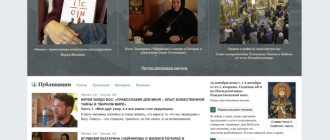Rublev.com
News March 3: Yuri Grymov, former producer of the Dozhd TV channel, director and screenwriter launched Russia’s first search engine Publev.com. for Orthodox Internet users. As Grymov said, the Rublev.com system is both a search engine and at the same time a database on Orthodoxy, a kind of “guide for believers” who in the search engine will find answers to all their questions about Orthodoxy. Rublev.com was developed over the course of two years, now the developers are looking for sponsors and funds to release a mobile version of the Orthodox search engine
Source https://www.uf.ru/News/u363/2015/03/04/705336
How they promote
They started by declaring that they were being targeted by making requests for all known words and the fact that the logs were full of “adult” requests to this pious site. And most importantly, they not only created a search engine, but now they are counting on the fact that someone will sponsor them.
New Orthodox social networks in examples
Due to the nature of my work, I periodically have to deal with attempts by all sorts of Internet activists to intervene in Orthodox communities with their stillborn projects. Moreover, time after time, these attempts look sadder and sadder. A few glaring examples.
Orthodox world
A few years ago I received a call from an unfamiliar number:
- Hello, hello. This is Igor. You and I are friends on VKontakte.
- Hello.
- Let you be a representative of our international Orthodox project... (hereinafter, a train of methods of convincing the significance of this enterprise).
- Funding?
— (something vague about finding sponsors and volunteering).
- So, no one will work for you for free anyway, this is unrealistic.
- (Another monologue on the topic of how the youth in Smolensk have harnessed themselves and are doing all this, and that in general it is not difficult and voluntary, and that the Orthodox should help the common cause).
- Well, I work in the diocese.
-...And you, sane? (the interlocutor stopped short, immediately switched to “you” and turned off the record “Hurray Forward”)
- No.
Then the interlocutor hesitantly tried to poke around with his project a couple of times, saying that everything was blessed at the highest level, etc. and gave up.
In fact, “blessed” for a project means that the project was created with good intentions, in theory it should contribute to the preaching of Christ and does not contradict Christian foundations. If the author does not require money for development from the benefactor, then any non-viable project, but beautifully designed on paper, can receive approval
What was this project like? Some kind of social network for Orthodox projects, which was supposed to attract patrons of the arts. The project was blown away, I really don’t remember the URL.
After some time, the same character sends me a message on VKontakte:
Good afternoon, (**name**), I need help filling out information about the **** diocese. At least at the level of advice. We are creating a convenient, beautiful, information resource, a real living encyclopedia about Orthodoxy. We are looking for like-minded people. You can already look at the resource being created at the address: orthodoxy-world.com, or https://Orthodoxyworld.rf and express your wishes and suggestions. You can do this right there by writing a message: Igor Zotov. .If interested, add me as a friend here on VKontakte. I will be glad.
There was no response to my reference to the fact that the diocese already has a website and is not bad. At the moment, this domain has expired.
Congratulations to all those who spent their personal time on it and tried to “do something good” there - your efforts turned into nothing thanks to the creators of the site.
Social Elitsa network
A couple of months ago I was sent a letter for review from the owners of the social network. Elitsa’s networks, in the best traditions of spam mailings, bombed all the bishops in Russia right up to the Far East (in fact, where I am copying the text from so as not to post my scans):
Currently, communication, especially among young people, takes place on the Internet, where issues related to the Orthodox faith are also discussed. But without the active participation of church specialists in the field of missionary and catechesis, people may receive distorted information about the Orthodox faith.
To unite Orthodox people at the parish level, the social network “Elitsa” was created. The project carries out its missionary activities with the blessing of His Holiness Patriarch Kirill of Moscow and All Rus', and cooperates with all synodal departments of the Russian Orthodox Church MP. Participation in the V General Church Congress of Diocesan Missionaries and other events allowed the Elitsa network to better understand the problems facing the Church today and propose ways to solve them.
First of all, it is important that the questions and discussions that take place in the Elitsa Orthodox network are corrected by specialists who have been trained in educational institutions of the Russian Orthodox Church.
We ask you to draw the attention of diocesan and parish specialists to the possibilities of the social network “Elitsa” for conducting missionary, educational and catechetical work and to appoint responsible persons
Attached to the letter was a campaign message on the topic that Elitsy is becoming more and more popular and is simply exhausted by sectarians, sufferers, neophytes and the need for someone to work in it for the Glory of God.
As a bonus, specialists were promised to be given special information on the social network. status (all according to the laws of marketing).
I had to kill the evening and thoroughly study this network:
- At the time of analysis, 15,000 people were registered in it. Not bad for a niche social network, right? But no. The social network is promoted as an article - with content. If you leave a comment on an article, a “miracle” happens - you turn out to be a registered user, and your profile is already generated.
- The promotion proudly stated “100,000 visitors per month.” This is approximately 4,000 per day. For an article writer who regularly publishes content, nothing outstanding.
- In large Orthodox communities on VKontakte, the audience totals more than 500,000 people (and this is only those who are members of the communities), and the “Elits” themselves are doing their best to promote themselves on VKontakte and other social networks)))
- The functionality supposedly “tailored” for the Orthodox, in fact, has nothing in it that could not be implemented in groups of normal social networks
- We see the prospect for the development of the service, as the creators see it, from the user agreement (yes, I even had to read it) “The Service has the right to conduct statistical and other studies based on the User’s Personal Data and information about the User’s actions on the Site. The Service has the right to provide access to such research to third parties to send personalized advertising to the User. The user gives his consent to such research and to receiving personalized information by accepting the Policy. The User may refuse such consent at any time by contacting the Service at the address specified in the User Agreement.”
Theologian - second place
The brainchild of Father Pavel Velikanov. The portal was launched almost 20 years ago. It feeds the church intelligentsia with its content to this day, although it closed not so long ago due to insufficient funding. A collection of the smartest books, dissertations and similar scientific texts. Suitable for those who have fully mastered the “ABC of Faith” and are eager to ascend to new heights of knowledge of God. Together with Radio Russia, the portal is working on the project “World. Human. Word". They say that in church they only teach rituals - how to light a candle and on what day to draw baptismal water. The same portal refutes the opinion of the Russian Orthodox Church as a dense medieval organization.
Are Orthodox social networks and search engines necessary?
My answer is no.
What can you find in Rublev.com that cannot be found in Yasha or Gosh?
Can this search work better than Yandex's MatrixNet? No.
What can be done in Elitsy that cannot be done on VKontakte? There's no such thing.
Then why?
Arguments of the creators
1. Secular social networks are clumsy, we will make them better and more “Orthodox”.
You will never make social. the network is better than VKontakte - your level of developers is not the same. As a result, seven will lag, will be clumsy in terms of usability, and the search engine will work more primitively than Yandex in the early 2000s. Features like “in whose honor I was baptized,” “angel’s day” and “holiday of the day” are interesting only to neophytes, reflexively reading everything that is painted in the color of Orthodoxy. If you don’t remember when your friend’s baptism day is, then it doesn’t really matter to you. If you don’t go to church regularly, then the Orthodox calendar (which is on a bunch of websites, available in the form of applications for smartphones, etc.) will not change anything.
2. This is a missionary site (option: a site for uniting Orthodox Christians).
Let's be honest. This is a platform for dividing the Orthodox and imitating catechesis. Who will the priests driven to the site by circular letters catechize? Other persecuted priests? Where does the unchurched majority with the worldview of “Orthodoxy” sit? In normal social networks. Friends of churchgoers are sitting there, and users of social media. Networks are known to sit where their friends and acquaintances sit. Each of us has non-church acquaintances in the majority, and they will not run after us to the clumsy Elitsa. Maybe he should stop suffering from bullshit and catechize those who want to in groups of normal social networks? There is demand.
3. There will be no “pornography.”
For me, VKontakte also has no pornography. When searching for a Video, the kind social network automatically checks the “safe search” box, just as for Yandex the default is “moderate search”, and if desired, the “family filter” can be easily turned on. So, it all depends on the user - if he wants to look for naked women, he will go to another search engine.
And in general, if you are concerned about the problem of adult content, install protection, for example from Kaspersky Lab. But the problem is not in the protection system, but in the user’s head.
The presence of vulgarity in the news feed also depends on the person himself - choose for yourself who you are friends with, whose news you read (and whether you read it at all), in which communities you sit. If a person is accustomed to absorbing content indiscriminately, then in Orthodox social networks. he won’t stick around on networks anyway - there won’t be enough fresh content, even if he starts posting it himself. But the feeds of his non-Orthodox friends from ordinary social networks will be specifically lost in Orthodox quotes, etc.
The ABC of Faith - fourth place
The portal was created for new Christians. It is designed in the form of a book, which gives it a unique personality. Contains an extensive library, and the texts of prayers are given along with the Russian translation. There is a forum where Orthodox psychologists and priests live, the main one among whom is Father Konstantin Parkhomenko. For those who wish to communicate within the church, the largest Orthodox dating club is located on the ABC of Faith. It is interesting because there is a kind of rating there: whoever understands church life the most has a higher rating. Tests to determine your level contain very deep and intricate questions - not every priest can even answer them right away. The advantage of this game is that the correct answer is shown right away, so that you can easily learn the truth right on the spot. The dating club also has an online chat for communication between lonely Orthodox hearts.
Why did this bother me?
Okay, in our diocese the bishop sends letters from such projects to specialists for analysis and feedback, while in others they simply issue a circular inviting priests to go, register and be a missionary to someone unknown.
Priests and youth workers spend their time trying to help people, sponsors spend money to support the project, and in the end:
- Almost zero emissions. One high-quality article on PravMir will bring much more benefit than kilometers of texts in Elitsy.
- The money spent on the development of the project would have brought much more benefit if it had been invested in, say, a dozen anti-abortion articles.
- The owner of a social network, creating it to amuse his ego (and make money), ultimately closes the project, not being obligated to anything either to the priesthood or to sponsors.
Friends, rather than creating yet another useless alternative platform, it’s better to salt the existing ones. And never appeal to administrative resources when promoting a project. Failure to promote yourself is the certain death of a startup in the next couple of years.
And now you can go to
the Home page
or look at other interesting posts from the
Life .








